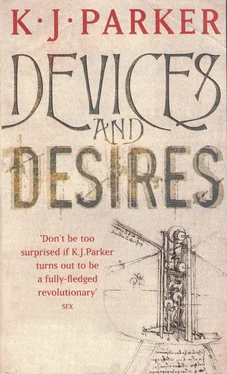K Parker - Devices and Desires
Здесь есть возможность читать онлайн «K Parker - Devices and Desires» весь текст электронной книги совершенно бесплатно (целиком полную версию без сокращений). В некоторых случаях можно слушать аудио, скачать через торрент в формате fb2 и присутствует краткое содержание. Жанр: Фэнтези, на английском языке. Описание произведения, (предисловие) а так же отзывы посетителей доступны на портале библиотеки ЛибКат.
- Название:Devices and Desires
- Автор:
- Жанр:
- Год:неизвестен
- ISBN:нет данных
- Рейтинг книги:3 / 5. Голосов: 1
-
Избранное:Добавить в избранное
- Отзывы:
-
Ваша оценка:
- 60
- 1
- 2
- 3
- 4
- 5
Devices and Desires: краткое содержание, описание и аннотация
Предлагаем к чтению аннотацию, описание, краткое содержание или предисловие (зависит от того, что написал сам автор книги «Devices and Desires»). Если вы не нашли необходимую информацию о книге — напишите в комментариях, мы постараемся отыскать её.
Devices and Desires — читать онлайн бесплатно полную книгу (весь текст) целиком
Ниже представлен текст книги, разбитый по страницам. Система сохранения места последней прочитанной страницы, позволяет с удобством читать онлайн бесплатно книгу «Devices and Desires», без необходимости каждый раз заново искать на чём Вы остановились. Поставьте закладку, и сможете в любой момент перейти на страницу, на которой закончили чтение.
Интервал:
Закладка:
Back in his favourite chair, facing the wall with the tarnished but glorious mosaic (Mezentine Destiny as a knight in armour riding down the twin evils of Chaos and Doubt), he reflected on the changed state of play. A fool would still be able to turn this fortuitous victory into a total defeat. A fool would try and take advantage by sabotaging the operation, in the hope of guaranteeing Crisestem's downfall. It was a sore temptation-he was almost certain it could be done, efficiently and dicreetly, one hundred per cent success-but it was also the only way he could lose, and losing in this instance would mean disaster. The obvious alternative was to be as helpful and supportive as possible and trust Crisestem to destroy himself. Psellus thought about that. If he had true faith, in the Foundrymen, in the Didactic movement itself, he wouldn't doubt for a moment that Crisestem would fail (because Didacticism was right, Consolidation was wrong, and good always triumphs over evil). It'd be easy to glide down into that belief; Crisestem was an idiot, no question about that. But he was cunning; his clever encircling manoeuvre had demonstrated that, even if he had turned his victory into a desperate wire for his own feet.
Psellus yawned. So what if Crisestem did succeed? He'd get no thanks for it outside the committee because nobody would know it had been him. Inside-well, you never could tell. Psellus was more inclined to believe that they'd remember him walking blithely into the pitfall long after he'd dug his way out clutching a fistful of rubies, but you couldn't build a policy on a vague intuition. Instead, he considered the worst likely outcome. Crisestem succeeded, thereby increasing his personal prestige inside the committee out of all recognition. So what? Just so long as Psellus kept his nerve and played his moves on the merits rather than through anger or fear, the position at the end would still be pretty much the same as it was right now. Psellus would still have the actual, procedural authority; he'd still see the minutes in draft before each meeting, and be able to make subtle, deft changes to key words under the pretext of proof-reading. As for Crisestem, the higher he rose, the further he had to come down when finally he did make a mistake. Tranquillity, serenity and patience.
To take his mind off the problem, Psellus reached for his copy of Vaatzes' dossier. Age: thirty-four. Guild: Foundrymen's and Machinists' (Psellus sighed; one in every barrel). Physical description: he read the details, tried to compile a mental image, but failed. Nondescript, then (except for his height; a tall man, six feet three inches, so among the hill-tribes he'd be a giant). Family: neither parent living-father had been a convener at the bloom mills for thirty years; a wife, Ariessa, age twenty-four, and a daughter, Moritsa, age six-so assuming she was seventeen when they married, he'd have been, what, ten years older. Psellus frowned. Was there a story behind that? He turned back to the wife's details. Father, Taudor Connenus, a toolmaker in the ordnance factory. Psellus compared his works number with Vaatzes' service history. Connenus had worked on Vaatzes' floor at the time of the marriage, therefore had been his subordinate. And Connenus was no longer a toolmaker but a junior supervisor; likewise Zan Connenus, the wife's brother, promoted at the same time as his father.
Psellus closed his eyes and thought about that. A hundred and fifty years ago, yes; it had been quite common back then for men to marry girls much younger than themselves, particularly where the marriage was part of some greater chain of transactions. There had been trouble-he struggled to remember his ancient history-there had been trouble in the Tinsmiths' Guild over a marriage and the practice had been disapproved (not denounced; it was still perfectly legal, but you weren't supposed to do it). There had been thirty years or so of compliance, a reaction, a counter-reaction, and then it had ceased to be an issue. At best, then, it was an eccentricity. He made a note to interview the two Conneni, and returned to the dossier.
Details of the offence: he read the technical data-straightforward enough-and the investigating officer's notes. The background was pathetic, really; a man wanted to make a nice present for his daughter and allowed his own cleverness to tempt him into disaster. The rest of the section was unremarkable enough, except for one thing that made Psellus raise his eyebrows in surprise.
Next in the dossier were copies of supervisors' annual assessment reports, going back twenty years. Psellus sighed, poured himself a small glass of brandy, and made himself concentrate. The picture that began to emerge was of a willing, serious apprentice, a reliable and careful machinist, a good supervisor; resourceful (and look where that had got him), intelligent, a planner; content to do his work to the best of his ability; a quiet man, a family man-rarely took part in social activities except where his status required it; a man who worked late when it was necessary, but preferred to go home on time. There had been no petty thefts of offcuts of material or discarded tools, no reports of private work done on the side; respected by his equals and his subordinates, few friends but no enemies-all those years as a supervisor and nobody hated him; now that was really rather remarkable. A mild man, but he'd married a subordinate's daughter when she was little more than a child, and promotions had followed. Query: do quiet and mild always necessarily mean the same thing?
Several pages of details, headed restricted, of his work on ordnance development projects. Psellus nodded to himself; a question which had been nagging him like mild toothache would appear to have answered itself. There were, of course, no Guild specifications for military equipment. It was the only area not covered by specifications, the only area in which innovation and improvement were permitted. Vaatzes, apparently, had been responsible for no fewer than three amendments to approved designs, all to do with the scorpions: an improved ratchet stop, upgrading of the thread on the sear nut axle pin from five eighths coarse to three quarters fine, addition of an oil nipple to the slider housing to facilitate lubrication of the slider on active service. That wasn't all; he'd proposed a further four amendments which had been rejected by the standing committee on ordnance design. Psellus sighed. Allow a man to get the taste for innovation and you put his very soul at risk. The compliance directorate had considered the issue on several occasions and had recommended a programme of advanced doctrinal training to make sure that workers exposed to the danger had a proper understanding of the issues involved; the recommendation had been approved years ago but was still held up in committee. A tragedy. A small voice inside his head reminded him that the training idea had been a Foundrymen's proposal, and that the subcommittee obstructing it was dominated by the Tailors and the Joiners. He stowed the fact carefully away in his mental quiver for future use.
Three approved amendments; he thought some more about that. Three amendments by a serving officer. Usually an amendment was held to be the glorious culmination of a long and distinguished career; it was something you held back until it was time for you to retire, and there'd be a little ceremony, the chief inspector of ordnance would shake you by the hand in front of the assembled workforce and present you with your letter of patent at the same time as your long-service certificate. It wasn't a perfect system, because a man might have to wait fifteen years before submitting his amendment, all that time churning out a product he knew could be improved; but it was worthwhile because it limited exposure to the innovation bug. Only a very few men proposed amendments while they were still working, and nearly all such applications were rejected on principle, regardless of merit. Three, for God's sake. Why hadn't he heard about this man years ago? And why, when the facts were here in the file for anyone to see, hadn't he been put under level six supervision after the first proposal?
Читать дальшеИнтервал:
Закладка:
Похожие книги на «Devices and Desires»
Представляем Вашему вниманию похожие книги на «Devices and Desires» списком для выбора. Мы отобрали схожую по названию и смыслу литературу в надежде предоставить читателям больше вариантов отыскать новые, интересные, ещё непрочитанные произведения.
Обсуждение, отзывы о книге «Devices and Desires» и просто собственные мнения читателей. Оставьте ваши комментарии, напишите, что Вы думаете о произведении, его смысле или главных героях. Укажите что конкретно понравилось, а что нет, и почему Вы так считаете.












